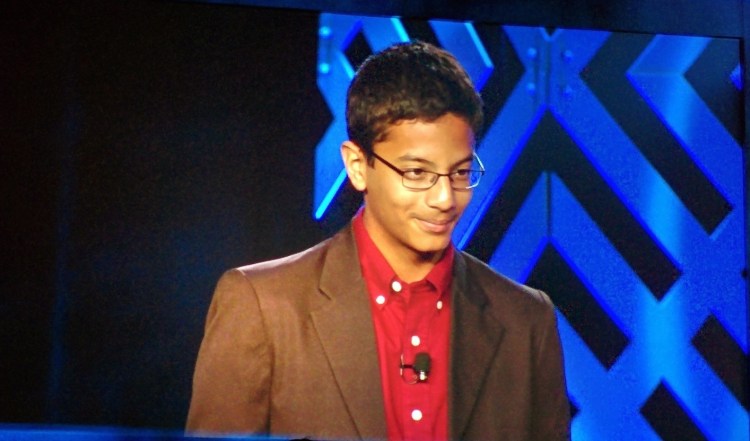Intel Capital, the venture arm of the world’s biggest chipmaker, is unveiling it has invested $62 million in 16 tech startups today. The investments show that Intel is still bullish about funding new tech companies that could one day spur lots of purchases of its microprocessors and other gear.
Intel has long seen itself as having a role in accelerating the adoption of new technology, all made possible by the electronics revolution that rests on its chips. The company said it expects to invest $355 million this year, compared to $333 million last year.
The 16 startups represent a broad spectrum of technologies, including wearables, the Internet of things (or connected everyday devices), big data analytics, chips, and smart devices.
The Santa Clara, Calif.-based company is making the announcement at its 15th annual Intel Capital Global Summit in Huntington Beach, Calif. Intel Capital President Arvind Sodhani will host an event with the startup CEOs for the companies that Intel is investing in at 12:15 pm PST on Tuesday, Nov. 4.
“Intel Capital invests in the technology continuum that runs from wearables and the Internet of things to big data analytics — and everything in between, including silicon, smart devices, PCs, the cloud, and datacenters,” Sodhani said in a statement. “We are focused on helping innovative companies develop across this technology ecosystem.”
The founders include 13-year-old Shubham Banerjee (Braigo Labs), who has invented low-cost Braille printers for the blind using Legos and Intel Edison chips, and Sundari Mitra, a 25-year semiconductor industry veteran who is now running her second startup, NetSpeed Systems.
Here are the investments, with Intel’s description of the companies:
New Devices/Wearable Computing
Avegant (Redwood City, Calif.), developing the next generation of wearable devices, is bringing to market the Glyph, a mobile personal theater that uses a micromirror display with built-in premium audio. Glyph raised more than $1 million in its Kickstarter campaign earlier this year.
Braigo Labs (Palo Alto, Calif.), founded by 13-year-old entrepreneur and middle schooler Shubham Banerjee, provides scientific and technological services by researching and developing technology-based innovations and services. Its products include Braigo v1.0, a Lego Braille printer that dramatically reduces the price of a printer from more than $2,000 to $350 for education, teaching, and home-use purposes.
Eyefluence (Reno, Nev.) transforms intent into action through your eyes. The company’s robust, low-power, eye-tracking technology, with its iUi interaction model, integrates into any augmented reality or virtual reality head-mounted display (HMD) to provide natural, intuitive eye tracking and control.
Mobility/Wireless
Andapt (Santa Clara, Calif.) brings a new genre of analog adaptive products for multifunction sensor integration and integrated system power management, enabling enterprise customers to achieve lowest power consumption, smart power management, high integration, high system reliability, and lower cost.
Audyssey (Los Angeles) is a leader in research-based audio technologies that correct acoustical problems to improve the sound quality of any device or listening environment. The company’s technologies are integrated into mobile apps and devices, TVs, automobiles, PCs, and home theater products from industry-leading manufacturers.
Incoming Media (Santa Clara, Calif., and Sydney, Australia) is a mobile video platform that uses predictive data analytics and intelligent content pre-loading to learn how a viewer consumes video on a mobile device and delivers a personalized mobile video experience with no interruption.
Inrix (Kirkland, Wash.) leverages big data analytics and predictive technology to help automakers, corporate fleets, governments, and news organizations reduce the economic and environmental toll of traffic congestion.
Screenovate Technologies (Israel) offers mobile solutions that cover entertainment, productivity, and education. Among other applications, its technology enables smartphone and tablet users to wirelessly beam movies, games, presentations, or other content from their mobile devices to their TVs or other large displays.
Thundersoft (China and Taiwan) is a mobile OS core technology and solution provider that accelerates product development by providing leading technology and services, specifically for Android smartphone and tablet services. [Investment subject to satisfaction of closing conditions.]
Advancing Microprocessor and SoC Development
NetSpeed Systems (Mountain View, Calif.) offers a system-on-chip (SoC) design platform and advanced on-chip network solutions that let SoC architects create designs that are significantly smaller and more power-efficient in a fraction of the usual time.
Reno Sub-Systems (Canada) designs, develops, and delivers subsystems used to control process systems made by OEMs, including vacuum-based chambers to deposit and etch specialty materials needed in advanced integrated circuit fabrication.
Big Data and Cloud Infrastructure
Gigya (San Francisco) makes a cloud-based customer identity management platform that helps customers turn unknown Web or mobile visitors into loyal and engaged customers.
PilotTV (Taiwan) is a digital signage network operator that designs, deploys and jointly operates digital signage systems for retail venues, operating over 6,000 screens in various channels including convenience stores, fast food chains, drugstores and rapid transit stations.
PrecisionHawk (Raleigh, N.C.) is an information delivery company that uses a small, unmanned aerial vehicle and cloud-based software to collect, process and analyze aerial data. Its solution provides actionable information to clients in civilian industries.
Prelert (Framingham, Mass.) packages data science into downloadable applications for everyday users. It uses machine-learning predictive analytics to learn the normal behavior patterns of populations of individual users, devices and resources.
Stratoscale (Israel) develops new technology to rethink next-generation data centers. It is building the runtime software infrastructure for scalable computing to help customers use all available computing resources and unify computing and storage across the data center.
Ossia (Redmond, Wash.) has smart antenna technology. Ossia redefines wireless power by safely delivering remote, targeted energy simultaneously to multiple devices as far away as 30 feet without line of sight and regardless of whether a device is stationary or moving.
VentureBeat's mission is to be a digital town square for technical decision-makers to gain knowledge about transformative enterprise technology and transact. Learn More

